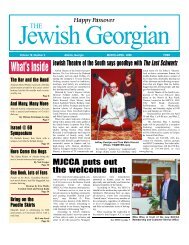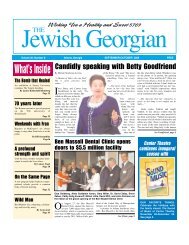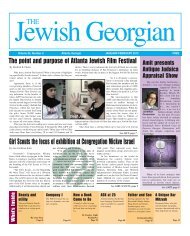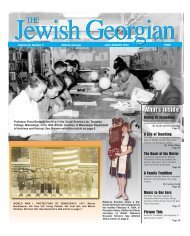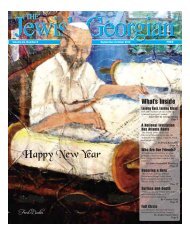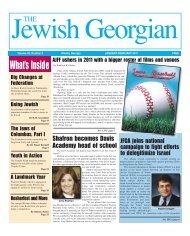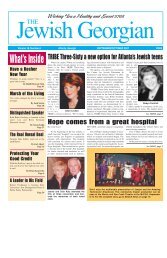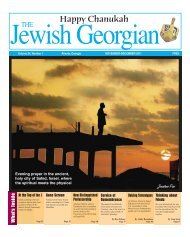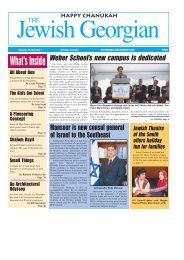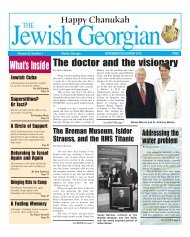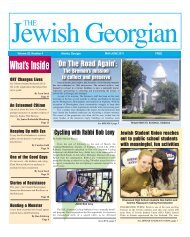JGA Mar-Apr 10 - The Jewish Georgian
JGA Mar-Apr 10 - The Jewish Georgian
JGA Mar-Apr 10 - The Jewish Georgian
You also want an ePaper? Increase the reach of your titles
YUMPU automatically turns print PDFs into web optimized ePapers that Google loves.
<strong>Mar</strong>ch-<strong>Apr</strong>il 20<strong>10</strong> THE JEWISH GEORGIAN Page 13<br />
Generations connected and beliefs reconsidered<br />
On a recent Saturday morning, I experienced<br />
something resembling, I believe, an<br />
epiphany. I say believe because I have<br />
never experienced anything like that before,<br />
and this was the first word that came to me.<br />
It was not an apparition (I did not see anything),<br />
I don’t believe in mysticism, and I<br />
certainly don’t believe in ghosts or spirits. I<br />
don’t even believe in the Hereafter. For me,<br />
when you’re gone, you’re gone. It was more<br />
a feeling of connectivity, a feeling of mystifying<br />
closeness and comfort.<br />
<strong>The</strong>re I was, sitting in a Reform temple<br />
in Atlanta, awaiting the reading of a portion<br />
of the Torah by one of our beautiful Atlanta<br />
grandkids, Julia. It was her bat mitzvah.<br />
As she approached the podium, silence<br />
pervaded the room as all prepared to listen.<br />
In her sweet, gentle voice, Julia sang the<br />
Hebrew verses, the difficult melodies of<br />
ancient, desert times. Her enunciation<br />
seemed perfect and her whole manner was<br />
Lift up your voice<br />
<strong>The</strong> organ has the greatest variety of sounds<br />
and pitches of any single musical instrument,<br />
and it is ideally suited to leading a<br />
congregation in worship, whether it be in<br />
majestic praise of God or in quiet contemplation<br />
of the divine. —Dr. Kimberly<br />
<strong>Mar</strong>shall<br />
Those who have shared the worship<br />
experience at <strong>The</strong> Temple in Atlanta can<br />
attest to the above statement. When the<br />
tones of its magnificent organ radiate from<br />
the pipes, you feel as if the reverberations of<br />
the deep, piercing waves are teleporting you<br />
along with the musical supplications to a<br />
higher level.<br />
Unfortunately, time and usage have<br />
taken their toll on this great instrument,<br />
which is now in dire need of service and<br />
repair. Without this attention, the voice of<br />
the instrument is muted and stands in jeopardy<br />
of going silent.<br />
<strong>The</strong> Pilcher organ, which was installed<br />
in 1931 when the present structure was<br />
built, was completely rebuilt in 1953. <strong>The</strong><br />
effort was under the supervision of Mr. G.<br />
BY Arnie<br />
Silverman<br />
BY Evie<br />
Wolfe<br />
Donald Harrison, president and tone director<br />
of Aeolian-Skinner Organ Company, an<br />
important American builder of many<br />
notable pipe organs, and was overseen by<br />
Mrs. Emilie Spivey, then the organist at <strong>The</strong><br />
Temple, and virtuoso Virgil Fox. With its<br />
four keyboards, each consisting of 60 notes,<br />
and 32 foot pedals, the organ was considered<br />
a unique instrument, and the tones it<br />
produced were considered unique as well. It<br />
was not uncommon for the Atlanta chapter<br />
of the American Guild of Organists to meet<br />
in <strong>The</strong> Temple sanctuary for its concerts.<br />
As Cantor Deborah Numark remarked:<br />
“<strong>The</strong> organ is part of our congregation’s history.<br />
It has the unique distinction of having<br />
some of the sweetest and warmest sounds of<br />
6th-grade religious school students view the organ as part of their course of study<br />
assured and confident. In all of my years<br />
experiencing nervous, if not frightened,<br />
<strong>Jewish</strong> children (including me and mine)<br />
perform this ritual of maturity, I could not<br />
recall anyone more assured than she.<br />
And then it happened. It lasted but a<br />
millisecond and settled over me like a<br />
warm, comforting blanket. For that immeasurably<br />
short, gripping time, I felt the presence<br />
of generations—those who have<br />
meant much to me and who shared the<br />
genes of this young woman performing so<br />
perfectly before me. I felt the presence of<br />
my and Myrna’s folks, Lou and Rose and<br />
Manny and Yetta; my grandfather, Philip;<br />
any organ in the city. That, coupled with the<br />
extraordinary acoustics of our sanctuary,<br />
creates musical dimensions and colors that<br />
are second to none. I can’t imagine our congregation<br />
without this historic instrument.<br />
It’s part of the legacy that the current generation<br />
will pass along to the next.”<br />
<strong>The</strong> organ and the music it produces<br />
are intended to heighten the religious experience,<br />
not to be the experience in and of<br />
itself. <strong>The</strong> organ’s components are cloistered<br />
from view, with its voice coming<br />
from behind the aron kodesh and its sacred<br />
scrolls. It becomes part of the totality of the<br />
service.<br />
<strong>The</strong> organ is part of the history of <strong>The</strong><br />
Temple, the first <strong>Jewish</strong> congregation<br />
established in Atlanta. It is part of the past,<br />
and there is a commitment that it will be<br />
part of its future.<br />
<strong>The</strong> 6th-grade curriculum at <strong>The</strong><br />
Temple’s religious school includes a section<br />
dealing with the study of American<br />
<strong>Jewish</strong> history. As part of this course, the<br />
students have studied the history of <strong>The</strong><br />
Temple’s organ, both as it applies to this<br />
congregation as well as the American<br />
scene. Rabbi Steven Rau, <strong>The</strong> Temple’s<br />
director of Life Long Learning, said,<br />
“Studying the history of the organ was<br />
an emotional experience for all of the<br />
6th- graders.”<br />
As one of the students remarked about<br />
my matriarch grandmother, Sarah; Myrna’s<br />
sister, Ruth; and Stanley, my brother, seemingly<br />
hovering over me in approval and<br />
appreciation. As tears welled in my eyes,<br />
they were quickly gone, but the warmth and<br />
peaceful comfort remained.<br />
Now I know this sounds somewhat<br />
ridiculous, but it happened. Maybe it was<br />
just a subconscious wish that, at that magical<br />
millisecond, those great people could<br />
see this pinnacle achievement they helped<br />
wrought. Whatever, it was momentous and<br />
memorable.<br />
Who knows? Maybe I have the religion<br />
thing all wrong.<br />
the organ’s place in the congregation, “It<br />
survived the bombing of our temple. It is<br />
rusty because of old age.”<br />
Now, with the appointment of Larry<br />
Pike, Jackie Montag, and Jack Holland, all<br />
former presidents of the congregation, to<br />
head up an organ-restoration committee,<br />
the leadership of <strong>The</strong> Temple is moving<br />
forward on returning it to its former condition.<br />
Pike said, “By the High Holidays<br />
of 2011, we hope to have a completely<br />
rebuilt organ.”<br />
Pike, Montag, Holland, and their<br />
committee are committed to seeing that<br />
the necessary funds will be raised to<br />
assure that the temporary loss of voice<br />
is properly treated. <strong>The</strong> organ has been<br />
one of the elements of worship that has<br />
made the religious experience at <strong>The</strong><br />
Temple special to its membership. It<br />
will be once again.



